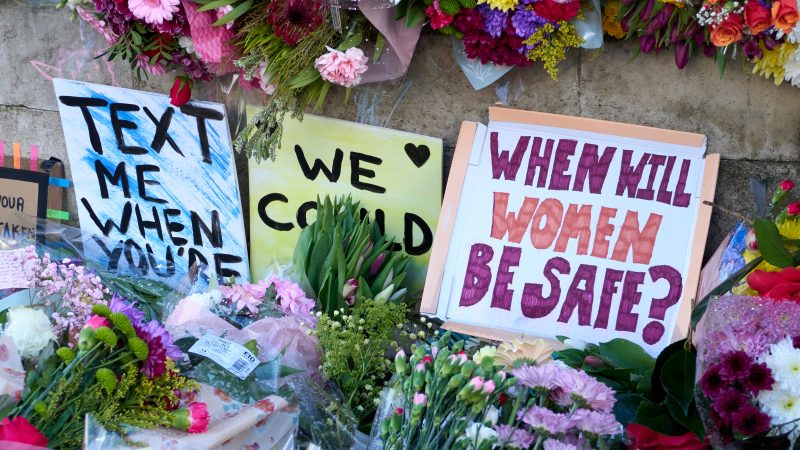
As more details about the horrific kidnap, rape and murder of Sarah Everard were revealed yesterday, a kind of collective horror struck women across the country. Since learning that her murderer was a serving police officer at the time he killed Sarah, we had been expecting to hear how he used his position to commit the crime. Reading the details was chilling and distressing.
Couzens used handcuffs and his Metropolitan Police warrant card to snatch Sarah as she walked home from a friend’s house. In the six agonising days she was missing, we heard the usual questions we always hear when harm is done to a woman by a man. Questions like ‘What was she wearing?’ ‘Why was she out in the dark?’ ‘Why was she alone?’, with the expectation that women should change their behaviour in order to prevent their victimisation and that our failure to keep ourselves safe is something we should be challenged about.
The truth is, as we all know, taking these steps doesn’t keep us safe. Women are not safe at home: 70% of women who are murdered are in their homes at the time. We are not safe at work either: half of all women have been sexually harassed at work. Many of us walking home in pairs have been approached by groups of men thinking it appropriate to jeer and leer at us.
We like to believe that violence against women is rare and hidden away. Every time a woman is killed, we are expected to believe it was an unpreventable tragedy, and yet the signs are always there – ignored, dismissed and excused.
Despite his occupation as a police officer, Sarah’s murderer seems to have a history that screams he was a risk to women. His ex-colleagues at the Civil Nuclear Constabulary (CNC), reportedly gave him the nickname “rapist” because he made some female officers feel uncomfortable. We have yet to hear what it was he did that made the women uncomfortable and why this was not addressed.
The IOPC also revealed that he was accused of indecent exposure on two other occasions, and concerns were raised that they were not properly investigated by the Met in the days before Sarah Everard was murdered. It seems unbelievable that any person working with the public would not be suspended from their job whilst an accusation they flashed their genitals in a public place was investigated. But the truth is that this kind of behaviour is condoned, through the dismissive approach to it as ‘boys will be boys’ or ‘banter’.
This conduct is not seen as what it is: a crime that is indicative of a type of man who likes to have power over women and cause us harm and fear. Every single case of indecent exposure, following someone, street harassment or criminal damage against a woman’s property should be treated by the police as the early warning sign it always is.
But it is not just police who need to take the time to address these behaviours. In bars, clubs, WhatsApp groups and workplaces across the country, there are people turning a blind eye to, or excusing, disturbing behaviour by men.
A recent poll for UN Women found that seven out of ten women of all ages had experienced some form of sexual harassment in public. This figure was 86% for younger women aged between 18 and 24. The survey found:
- Over half of women had experienced catcalling
- Four out of 10 had been groped or faced unwelcome touching
- A third of women had been followed
- One in five had faced indecent exposure
Are we expected to believe all of these incidences occur in places where only the victim and perpetrator were present? Or does much of it occur in places where the perpetrator was in the presence of other people who ignored or excused it? How many of the men who kill partners and ex-partners spent years receiving sympathy from friends and relatives who blamed the victim for the behaviour of the perpetrator?
Women will never be safe as long as predatory, controlling and harassing behaviour towards us goes unchallenged. It must no longer be acceptable to challenge women on what we wear or where we go, but instead we must change our culture so that objections are aimed towards those whose behaviour prevents women from being safe.




More from LabourList
Josh Simons resigns as Cabinet Office minister amid investigation
‘After years of cuts, Labour’s local government settlement begins to put things right’
‘The Sherriff of Wild Westminster: what must change in elections bill’